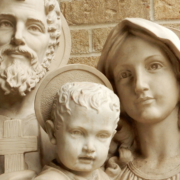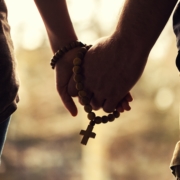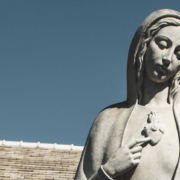Athletics Should Uphold Truth of Body and Gender
Editor’s Note: The article below is included in the forthcoming winter 2021 edition of the Newman Society’s Our Catholic Mission magazine.
Seeking “a fair and safe playing field for all children and young adults,” the U.S. bishops in October backed federal legislation to prevent schools and colleges from allowing male athletes—including those who identify as transgender—to participate in female sports.
The bishops’ position should not be surprising. It reflects the Church’s clear teaching that gender is not divisible from biological sex, and that men and women should not be treated as identical despite sharing equal dignity and humanity. The Church has a long history of single-sex education and athletics programs, recognizing both physical and social differences between the sexes while protecting students’ safety, development and chastity.
But in athletics programs at many Catholic schools and colleges today, the Church’s teaching is less clear. Some participate in athletics conferences that allow students to declare their gender and compete against students of the opposite sex, while others have similar internal policies.
In Connecticut, three female high school athletes have filed a federal lawsuit claiming violation of the federal Title IX law, because biological males have been allowed to compete and win female titles in state track championships. The U.S. Department of Education has agreed that girls have the right to compete in all-female events. But since 2017, when the Connecticut Interscholastic Athletic Conference allowed students to choose teams according to a “preferred gender identity,” Catholic schools have continued to participate in the league.
Likewise many Catholic colleges belong to the National Collegiate Athletic Association (NCAA), which allows a biological male to compete on a women’s team after one year of testosterone suppression treatment. The NCAA hosted a summit on gender identity last October and is expected to expand its transgender policies and outreach.
Responding to the apparent need for clarity in Catholic education, the Newman Society is developing recommended standards for policies addressing all aspects of athletics programs—not only gender issues, but also the role of sports in virtue development and many practical concerns. These will be circulated for comment by athletics directors as well as diocesan leaders, school leaders and theologians.
But to specifically address the issue of gender, we have circulated and published a helpful advisory by veteran educator Dr. Dan Guernsey, titled “Protecting the Human Person: Gender Issues in Catholic School and College Sports.”
Body and Soul
When athletics are done well, it’s a great blessing for Catholic students, Guernsey writes.
Athletics serves the mission of Catholic education, which “entails the pursuit of truth, the integral formation of the human person, the sanctification of students, and service to the community,” he notes. Sports in Catholic schools and colleges “can be particularly effective in developing virtue, building community, and providing a powerful experience of the unity of body and soul.”
The Vatican teaches:
…in the context of the modern world, sport is perhaps the most striking example of the unity of body and soul. …neglecting the unity of body and soul results in an attitude that either entirely disregards the body or fosters a worldly materialism. Hence, all the dimensions have to be taken into account in order to understand what actually constitutes the human being.
Gender ideology is thus a danger to students and incompatible with a Catholic understanding of sport.
“Because athletics is such a powerful influence on both individuals and cultures, it can also pose a threat when it does not serve truth or does not serve to praise God,” writes Guernsey, recalling Pope St. John Paul II’s teaching that “self-denial and respect for the body as God’s gift are fundamental to a healthy athletic program.”
“Gender theory is a distortion of the full development of a person and attacks the integrity of the body,” writes Guernsey. “It works against a Catholic understanding of athletics and the good of the person and so has no claim on Catholic programing.”
The way forward
Guernsey recommends practical steps that Catholic schools and colleges should take to maintain a strong Catholic identity:
- “Catholic educational institutions should publicly and explicitly affirm and seek to implement their faith-based mission and develop and consistently abide by policies in all programs that support this mission. They should assert religious freedom to uphold Catholic teaching and claim exemption from laws, regulations, athletic association rules, etc. that demand conformity to gender ideology.”
- “Athletic programs should include in their goals the use of athletics as a means of inculcating virtue, especially justice and fair play, promoting the unity of body and soul, and protecting the human body not only from physical injury, but also from any attack on its integrity, exploitation, and idolatry.”
- “Athletic policies should require that students participate on sport teams consistent with their biological sex.”
- “Athletic personnel should be formed in a spirituality of athletics as part of their ongoing professional development. Such formation may include presentations by theologians on Christian anthropology, the role of sport and play in human well-being, and sports as a tool of evangelization and virtue development.”
By taking a leading role in local and national conversations about gender in sports and asserting the importance of single-sex competition, Catholic athletic directors and education leaders can find common ground with others. Some other Christian schools and colleges will share our moral perspective, while others will share our concerns for player safety, fair play, and justice. Advocates for women should be concerned about protecting single-sex athletics to ensure opportunities for girls.
“Catholic education is devoted to the sanctification of its students and integral formation by witnessing to Christ and all that is true and good,” Guernsey writes. “To lead the children in their care to God requires that they encounter the fullness of His truth and that they not foster situations in which students might be led astray in matters of basic human nature and morality.”









